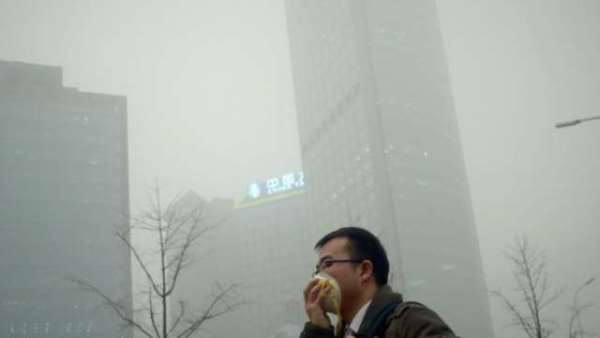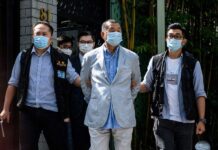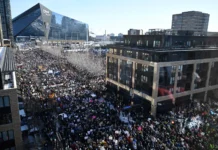2017 saw the weakest full-year improvement in air quality since the start of Beijing’s “war against pollution”
Dikang, chinaworker.info
The new Ministry of Ecology and Environment (MEE) was unveiled at the March National People’s Congress (NPC) as part of a major governmental shake-up. The birth of this super-ministry marks a stepping up of Beijing’s “war against pollution” launched four years ago. At least that’s the message the CCP (so-called Communist Party) dictatorship wants to send.
Xi Jinping’s regime has identified “three critical battles” that it must win by the year 2020 – against pollution, financial risk and poverty. For Xi, whose mission is to insure the CCP dictatorship’s survival, through unprecedented centralisation of control and personal dictatorship, this is a trinity of dangers that could trigger mass unrest and threaten the regime’s grip on power. That his regime gives itself just three years to successfully prosecute the “three critical battles” underlines how close China could be to major conflict.
China has become an ecological disaster zone, with air pollution killing over one million people every year according to the World Health Organisation (WHO). Government reports reveal more than 80 percent of China’s groundwater – used by farms, rural households and factories – is not fit for drinking, while 19.4 percent of China’s farmland is contaminated by chemical pollutants and metals. This amounts to 250,000 square kilometres of contaminated soil, equivalent to all the farmland in Mexico.
➵ Chinese regime’s anti-pollution policies doomed to fail
All this is the result of decades of wild, unplanned and uncontrolled industrialisation, with environmental protection laws largely ignored. The contamination of the air, water, soil and food chain is not an inevitable by-product of economic modernisation as some argue. It becomes inevitable when economic development is itself contaminated by capitalism and its profit motive, rather than following a planned approach subject to democratic control and management by the working class.
Transfer of powers
The new MEE acquires a number of powers formerly held by the National Development and Reform Commission, Ministry of Water Resources and Ministry of Agriculture, giving the new ministry control over climate, water and agricultural pollution policies in addition to the powers previously held by the Ministry of Environment Protection.

The rationale behind this is that China’s environmental watchdogs have always lacked real power. But there was a reason for this. Powerful economic sectors like energy, mining and transport, and regional elites anxious to grow their economic power, resisted a stronger environmental agency to keep costs down and profits up. The central government’s repeated attempts to stiffen environmental policy, driven by its fear of political upheavals, are part of Xi Jinping’s ongoing power struggle against rival vested interests.
The CCP has invested enormous political and actual capital in the anti-pollution struggle (1 trillion yuan to fight soil pollution alone). But it remains to be seen whether the new super-ministry will live up to the hype. The regime-friendly South China Morning Post, a Hong Kong newspaper, quoted a former senior environmental ministry official, speaking anonymously, who expressed scepticism that this would “be enough”.
This newspaper noted that the sweeping shake-up of government departments “fell short of establishing an all-powerful energy ministry to oversee the country’s vast coal, oil and power sectors despite intense speculation this would be the case.” As in other countries, China’ fossil fuel sector is a bastion of powerful interests engaged in a frenetic pushback against the public pressure for climate and anti-pollution policies that eat into their profits.
A mixed report card
Recent improvements in air quality in Beijing and other northern cities during the winter have been held up by the CCP as a sign its policies are working. If these claims were true it would represent a huge change in life quality for tens of millions of people. Unfortunately, the reality is not so encouraging.
In December, Beijing climbed into the top ten cities in China for air quality – ranked ninth. Average PM2.5 levels – hazardous small dust particles in the atmosphere – fell by 33.1 percent in Beijing, Tianjin and 26 surrounding cities during the last three months of 2017, according to a Greenpeace analysis. Despite this, average daily levels of PM2.5 were still more than double the WHO’s “unsafe” level of 25 micrograms per cubic meter.
➵ China: Li Keqiang’s ‘war against pollution’ is firing blanks
The CCP regime is of course claiming a big victory for its policies, which include increased inspections and punishments for violations, establishing coal-free zones and relocating some heavy industries from around Beijing, and restricting car usage.
However, as the Greenpeace study points out the improvement during the winter was also due to “exceptionally favourable weather”, with cold fronts from Siberia bringing winds and rains to break up ground-level pollution. The weather was responsible for lowering average PM2.5 levels in Beijing by around 20 percent in November and 40 percent in December, according to Greenpeace.
In fact, rather than a ringing success, 2017 saw the weakest full-year improvement in air quality since the CCP’s “war against pollution” began. Average PM 2.5 levels fell by just 4.5 percent across the country despite massive expenditure and relocation of industrial production. Furthermore, average PM2.5 levels actually increased in parts of eastern and southern China, including the Pearl River delta. Weather conditions played a part in this too, but it also reflects the movement of polluting heavy industrial output to the east and south following the crackdown in the north.
Dictatorial capitalist rule is leading to environmental Armageddon. The only solution is to unleash the collective creative power of the people – putting the working class in control of economic and political development, to eliminate capitalism and uncontrollable bureaucracy, and transform society on environmentally sustainable socialist lines.




